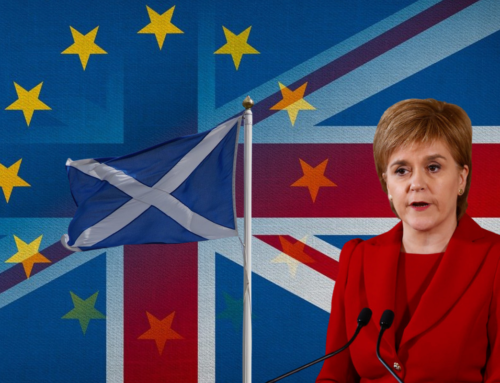
by Brendan Donnelly
Director, The Federal Trust
31st May 2019
The European Elections mark an important watershed in the Brexit process. They show that the Conservative Party will never accept a negotiated Withdrawal Agreement from the European Union; made a General Election later this year considerably more likely; moved the Labour Party several steps along the road towards supporting a new European referendum; and give good hopes to campaigners for a People’s Vote that such a referendum can be won for “Remain.” None of these are happy outcomes for the departing Theresa May. It is easy to understand why she viewed with such horror the insistence of the European Council in March that European Elections should take place this year in the UK.
The Conservatives in turmoil
The success of Nigel Farage’s Brexit Party in the Elections came overwhelmingly at the cost of the Conservative Party, the electoral humiliation of which was without recent parallel. Over the past month, the Prime Minister was able to call upon almost nothing in the way of the loyalty and support the Party traditionally extends to its leaders during an electoral period. There would be very few members of the Conservative Party left if all those who voted for the Brexit Party on 23rd May were required to relinquish their membership. Radical Euroscepticism has for many years been the dominant philosophy of the Conservative Party outside Westminster, and local Conservative Associations have been strikingly willing to support the members of the European Research Group in their undermining of Theresa May’s leadership. It is clear that the membership will seek as her successor someone who pursues a fundamentally different approach to British withdrawal from the EU to that reflected in the current Withdrawal Agreement. Given the insistence of the EU that no change is possible to this Agreement, a “no deal” Brexit is therefore the only alternative policy that realistically remains.
Most of those Conservative MPs who wish to succeed the Prime Minister as leader have predictably sought to reinforce their candidature by claiming that they are willing and able either to renegotiate the present Withdrawal Agreement or to leave the EU with “no deal” on 31st October at the latest. They know that the Party will only elect a candidate giving such delusory undertakings. The Party moreover will hold the elected candidate to his or her promises. Over the coming six months the Brexit Party will offer a welcoming political home to Conservatives fearing that Brexit is being “betrayed” by Theresa May’s successor. Boris Johnson or whoever the next Conservative leader may be will be compelled by the pressing fear of Conservative schism to carry out the nationally disastrous promises given during his or her leadership campaign. When the former Deputy Chair of the Conservative Party James Cleverly says that no Brexit is worse than a “no deal” Brexit, he is right if the context of his remark is the future of the Conservative Party rather than the future of the UK.
But a “no deal” policy, eminently understandable as a tactic in a Conservative leadership election, will bring with itself considerable political risks. It is far from certain that the next Conservative leader committed to “no deal” would be able to command a majority in the House of Commons, where there is anyway no existing Conservative majority. There is a small but increasingly disenchanted group of Conservative MPs who will be reluctant to acquiesce in the recklessness of a new Conservative Prime Minister willing seriously to envisage the possibility of the UK’s leaving the EU in such a chaotic fashion. It would not require many such Conservative MPs to refuse their support in a Vote of Confidence for a new election to be triggered. It is difficult (although not impossible) to imagine that any alternative government could be constructed after a lost Vote of Confidence within the fortnight stipulated by the Fixed Term Parliaments Act. A General Election in October now seems a realistic possibility.
A pact with Farage?
After their poor performance in the European Elections, it might be thought that both main parties would face a General Election with trepidation. Neither the Labour nor the Conservative Party would, however, probably be fighting on the same basis as they fought the European Elections. If the Conservative Party were credibly claiming that it wanted a “no deal” Brexit as ardently as does Nigel Farage, it could expect to win back many of the votes it lost to the Brexit Party on 23rd May. Nor could some form of electoral pact between the Brexit Party and a new Conservative leader be excluded. There is nothing in the sole policy of the Brexit Party to which most Conservative members or many Conservative voters would take exception. Nigel Farage might well be attracted by the prospect of senior ministerial office in a future Conservative government.
Similarly, the Labour Party is already drawing lessons from its own poor performance in the European Elections, during which it was widely and rightly criticized for the ambiguity of its approach to Brexit. In the same way as many Conservative members voted for the Brexit Party on 23rd May, many members of the Labour Party voted for parties clearly committed to remaining in the EU. The levels of disenchantment shown by these voters strongly suggests that Jeremy Corbyn’s Labour Party would be unable to rely on their support in a General Election. The Leader of the Opposition has attempted to meet this problem by promising a People’s Vote “in all circumstances” before the UK leaves the EU.
Jeremy Corbyn will however come under increasing pressure to satisfy the great majority of his members and voters who wish to remain in the EU by giving them a clear undertaking that he and his party will campaign in any referendum to remain in the EU. There has been justified suspicion that the Opposition Leader simply envisages a confirmatory referendum on the form of Brexit which he favours and which he claims to believe can be negotiated with the EU. There is now, however, such a political momentum within the Labour Party in favour of “Remain” that any equivocation will be extremely difficult to sustain over the coming months. Jeremy Corbyn has often sought to evade interrogation on the details of his approach to the People’s Vote by stressing his preference for a General Election. Ironically, the calling of a general election in the latter half of this year would not help him to avoid pressing questions on Europe. On the contrary, the first questions posed to him at the beginning of any campaign would precisely relate to his attitudes to a People’s Vote.
What about a People’s Vote?
A General Election this autumn is now perhaps the most likely, but by no means the only route to a People’s Vote. Even without it, it seems that a number of Conservative MPs, including the Chancellor of the Exchequer Philip Hammond, are beginning to contemplate such an outcome more favourably. This might be for them a welcome opportunity to prevent a “no deal” Brexit, without at the same time risking a Corbyn premiership through a General Election. If 50 Conservative MPs concluded that a People’s Vote was their preferred option, that would almost certainly suffice to bring about a majority in the House of Commons. The Speaker has made it clear that he would be procedurally sympathetic to attempts by the Commons to provide alternatives to a “no deal” Brexit. It is difficult to imagine the EU’s refusing to extend the Article 50 in order to hold a referendum that might lead to the cancellation of Brexit.
If there is a People’s Vote, whether between Remain and the negotiated Withdrawal Agreement, or between Remain and a no deal Brexit, the European Elections provide good grounds for hope within the “Remain” camp. The votes for the Brexit party and for UKIP taken together suggest that at most 35% of the electorate support a “no deal” Brexit. 40% of the votes cast went to parties unambiguously in favour of remaining in the EU, with the Liberal Democrats polling particularly well. The balance of votes went to the Labour (14%) and Conservative (9%) Parties. Since the great majority of those voting Labour will be Remain supporters and so will at least some of those voting Conservative, this suggests a definite Remain majority on 23rd May. These figures correspond reasonably closely with polling figures showing a consistent majority for Remain over the past year. Ministerial opponents of a People’s Vote often implicitly recognise this change of public sentiment by their insistence that Brexit must not be “put at risk” by a further referendum.
Winners and Losers
Given that no major political party has been opposing the principle of Brexit over the past three years, the resilience of the “Remain” sentiment since the EU referendum has been extraordinary. Whereas the General Election of 2017 appeared to reassert traditional voting loyalties to the two major parties, the European Elections have demonstrated that Brexit is now an issue capable of breaking these traditional loyalties. An opinion poll published on 30th May showed the Brexit Party and the Liberal Democrats, the most successful parties in the European Elections, still several percentage points ahead of both Labour and the Conservatives. It may well be that a People’s Vote will bring in its wake a radical restructuring of the British party landscape, reconstituted to reflect pro-Brexit and anti-Brexit sentiment. It would be poetic justice if the major losers in this restructuring were the Conservative and Labour Parties. It was David Cameron’s attempts to manage the internal fissures of his Party that led to the original mismanaged EU referendum; Jeremy Corbyn has since 2016 treated Brexit as simply a tactical question from which he and his party might derive electoral advantage. For many years the Labour and Conservative Parties paid no price for the frivolity of their European policies. The European Elections of 2019 were the moment when the bill for such irresponsibility was put on the table.







[…] The European elections: Signs of things to come for Brexit Federal Trust for Education and Research, May 2019 […]